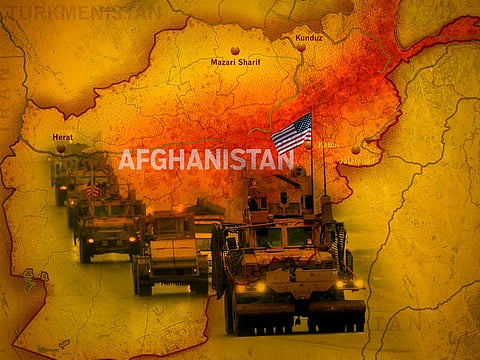Afghanistan War: Lessons for the US and the world
Tragedy that predated both Trump and Biden was a failed nation-building project

Last week, the Biden administration released a 12-page summary of the highly classified review of US troops’ withdrawal from Afghanistan in August 2021.
In March, a former US marine, who was tasked to protect Kabul airport and was badly injured in a suicide attack, in testimony before the Republican-majority Congress had described the withdrawal as a “catastrophe” and “an inexcusable lack of accountability and negligence.”
However, not so unexpectedly, the Biden administration’s review takes hardly any responsibility and blames the Trump administration and its decision to reduce the US troop presence in Afghanistan substantially, the 2020 Doha agreement, and the release of thousands of Taliban prisoners.
The only mistake the Biden administration accepts is that it should have started the evacuation earlier.
No doubt, the US withdrawal from Afghanistan was messy. The deadly bombing at the Kabul airport killed 13 US soldiers and 170 Afghans who were desperate to flee Taliban-controlled Afghanistan. The images of Afghans hanging from the aeroplane’s landing gear and falling from the sky startled the world.
A chaotic withdrawal
Taliban fighters took total territorial control within days, President Ashraf Ghani fled the country, and the 300,000-strong Afghan army collapsed.
Indeed, Trump’s Doha deal and May 2021 deadline didn’t give the Biden administration too much space to manoeuvre a negotiated and orderly departure.
However, whatever time President Biden had on his hand, he didn’t even use it smartly to get the Taliban to agree on any meaningful power-sharing agreement and ensure Afghan women get the education and employment rights.
The early months of his presidency were spent reviewing Afghan policy and then a very ham-fisted attempt at diplomacy before declaring in April 2021 for an unconditional withdrawal.
It is not so important whether the US troops’ withdrawal would have been more orderly in August 2021 or whether the Biden administration could have made the withdrawal dependent upon an agreement with the Taliban about forming an inclusive government and protecting women’s rights and minorities.
In this increasingly bipolar world, what was the guarantee that the Taliban would be honouring those agreements with the US? Not the US troops’ withdrawal but the Afghanistan War itself needs to be reviewed dispassionately for the US and other big powers to learn and realise how the wars and so-called nation-building projects should be the very last option.
In the Afghanistan disaster, Trump and Biden played minor roles. If they must be blamed, it should be only for Trump committing to bring an end to the disaster and Biden bringing an end to it. A catastrophe of two decades was anyway bound to end disastrously.
Unsustainable nation-building project
The tragedy did not start with Trump or Biden; it had started in October 2001, when the US and its allies invaded Afghanistan because the Taliban regime refused to hand over Osama Bin Laden in the wake of Al Qaida’s 9/11 attacks.
George W. Bush took his country and allies to war without telling his country and the world what goal he had in mind. The war that seems to have initially started as a counter-insurgency operation ended up becoming a highly unplanned and unsustainable nation-building project.
Probably the most expensive failed nation-building project the world had ever witnessed. The eight years of the Obama administration could have done what Biden did in August 2021, but it decided not to do so due to fear of adverse political implications.
The war is too important to be waged on emotional issues alone. When the war started in October 2001, no one knew what the end goal was! That confusion continued till the end. The reasons for occupying a country of 40 million people year after year were also not known to the US and its allies.
When there were no aims or goals, it is easy to assume that there were no coherent strategies to address these issues. The US spent more than $2.3 trillion in the war in Afghanistan and lost more than 6000 soldiers and contractors without knowing why it was doing so.
20 years of US occupation was neither successful in fighting the Taliban insurgency nor did it win the hearts and minds of civilian Afghans. The US-backed governments in Afghanistan lacked legitimacy. Internal violence increased due to the growing drug trade.
The $88 billion project to train and equip the Afghan military went up in smoke because it was too technologically advanced and highly dependent upon American air support to be sustainable without it.
No well-thought-out plans
First, the Bush and the Obama administrations struggled to develop and execute a coherent strategy for their goals for 16 years. Thus, it should not be surprising that Trump and Biden had no well-thought-out plans for troops’ withdrawal.
It would also be unfair to blame either Trump or Biden for underestimating the time needed for a smooth and respectable troops’ withdrawal. The previous administrations had consistently created unrealistic timelines and objectives for various operations.
Finally, it was not the Afghan military that failed; almost all the institutions like parliamentary democracy, judiciary, and civil society, which were created and aided by the US, also disappeared. Also, because of bad planning and corruption, many infrastructure projects have become economically and environmentally unsustainable.
If the US, whether the White House or Congress, is interested to understand what had gone wrong in Afghanistan, it should review its policies and actions since 2001 and not limit it to 2020-2021 only.
A comprehensive bipartisan review of the disastrous Afghanistan adventure would help the US and other big powers avoid these blunders in future.
Sign up for the Daily Briefing
Get the latest news and updates straight to your inbox




